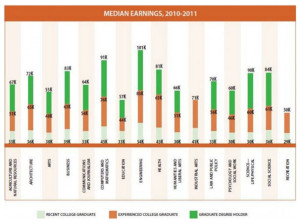Guest Blogger and Former CUPID Associate Emily Bishop ’14
When entering college, students have a tough question to answer: what should my major be? If you look at the chart for 2010-2011 post-graduate earnings, the liberal arts don’t look very appealing. However, it’s not as bad as it seems. So, throw out your preconceived notions of majoring in English, because the humanities actually prepare students to succeed in the working world just as much as the “practical” majors.
 Specifically, professional writing and rhetoric majors have been given the tools of thought through deep-seated analysis and understanding processes. Rhetoric can essentially be broken down into signs that shape knowledge and play a critical role in determining what is right, true, and probable. And, in today’s society, being able to sell an idea by shaping knowledge is one of the keys to success. Professional writers and other humanities majors understand how to sell an idea because they are extremely good writers who have the ability to articulate and verbalize what they are thinking. So naturally, they will be successful. Right? Mark Edmundson, an English teacher at UVA, think otherwise. In a Washington Post editorial, he says, “…the humanities are not about success. They’re about questioning success — and every important social value.”
Specifically, professional writing and rhetoric majors have been given the tools of thought through deep-seated analysis and understanding processes. Rhetoric can essentially be broken down into signs that shape knowledge and play a critical role in determining what is right, true, and probable. And, in today’s society, being able to sell an idea by shaping knowledge is one of the keys to success. Professional writers and other humanities majors understand how to sell an idea because they are extremely good writers who have the ability to articulate and verbalize what they are thinking. So naturally, they will be successful. Right? Mark Edmundson, an English teacher at UVA, think otherwise. In a Washington Post editorial, he says, “…the humanities are not about success. They’re about questioning success — and every important social value.”
This idea stems from Plato whose definition of rhetoric involved knowing the truths, principles, and nature of the human soul. By understanding and questioning one’s own social values and truths, you are able to pursue whatever you’d like. Edmundson says, “These students [humanities majors] are usually not in pursuit of traditional success. They have often been inspired by work they’ve encountered in humanities courses — and, for a time at least, they are choosing something other than middle-class corporate life.” But, don’t be confused. There are many humanities majors who continue on to the typical “middle-class corporate life.” However, Edmundson believes they join that world with more social and self-awareness.
The social and self-awareness, for professional writers, comes from how they’ve been taught to make decisions. Through the rhetorical situation, the available means of persuasion, and the rhetorical canons, (just to name a few) professional writers know how to interact and understand emotions, how to learn new information, and call an audience to action. Because professional writers have that foundation, they understand that not every situation can fit into a specific mold and one must adjust accordingly. Thus, professional writers in particular, are able to think of every important social value and pursue any type of career.
Edmundson finishes his article by saying, “What makes humanities students different isn’t their power of expression, their capacity to frame an argument or their ability to do independent work. Yes, these are valuable qualities, and we humanities teachers try to cultivate them. But true humanities students are exceptional because they have been, and are, engaged in the activity that Plato commends — seeking to understand themselves and how they ought to lead their lives.
Are you living a virtuous life? Are you questioning success — and every important social value? If not, I challenge you to.
Major in the humanities. Not just for a good job, but for a good life!
Click here for Edmundson’s article.


 Follow
Follow